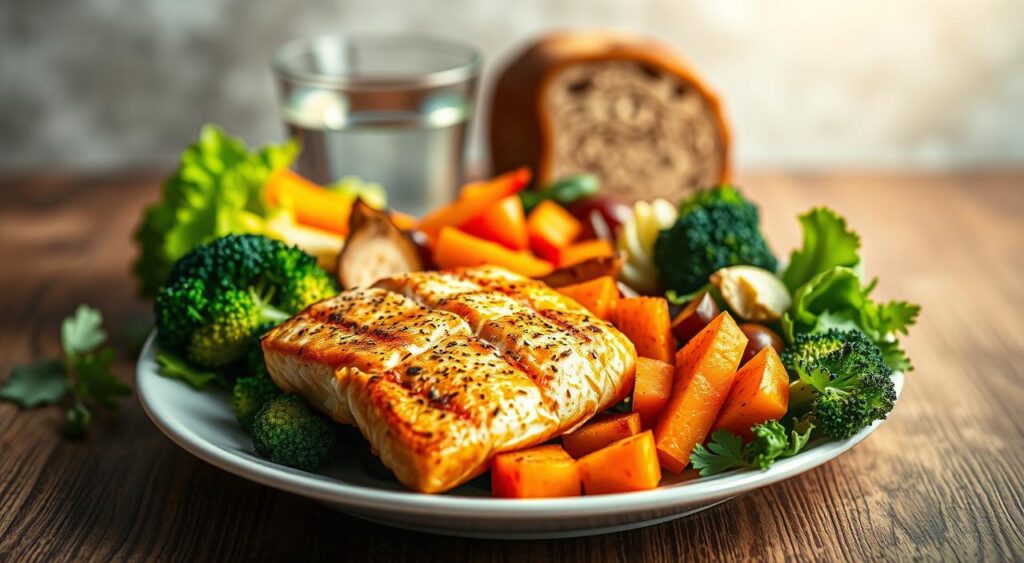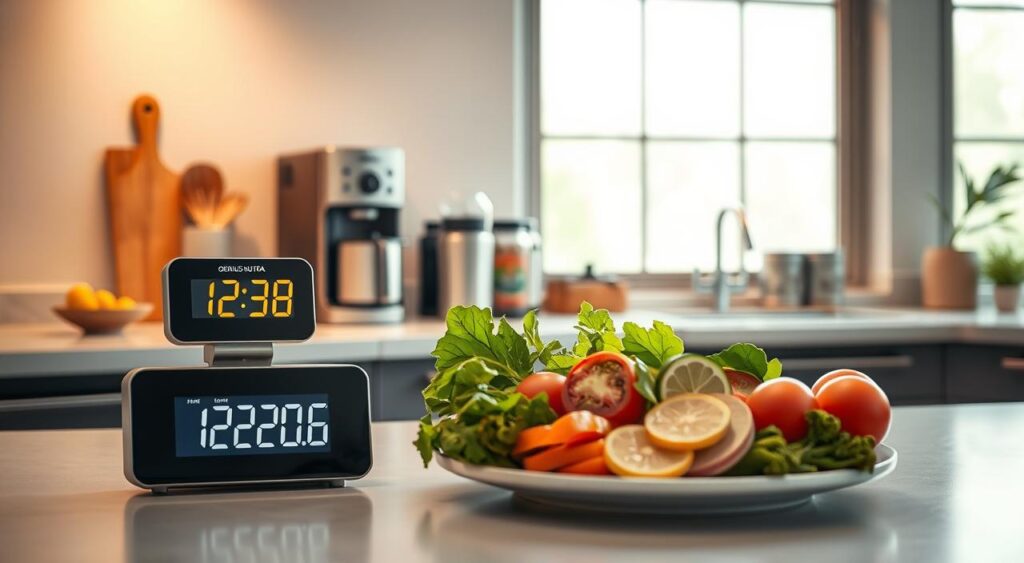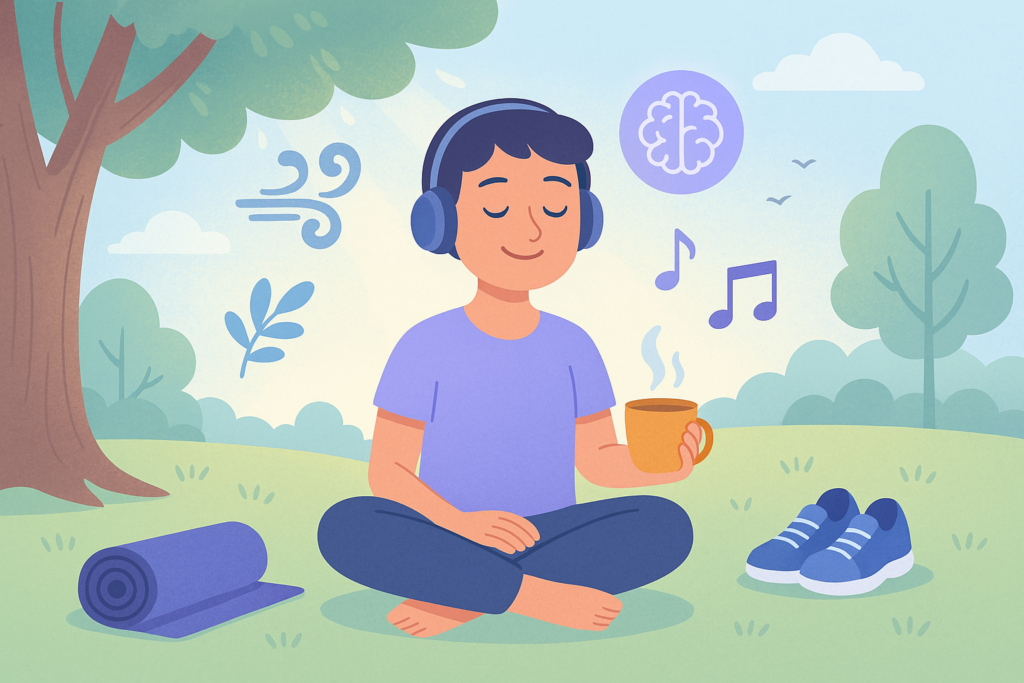Ever thought your healthy eating might be causing your tiredness? It’s common to think that eating well always gives us more energy. But, some healthy habits can actually make us feel more tired. This is true for many people who are always on the go.
Feeling tired all the time is a big problem for many. It’s important to look at our daily habits that might be sucking our energy away. Taking breaks and managing stress are key to keeping our energy up.
Understanding Healthy Eating Habits
Healthy eating means choosing nutritious foods in the right amounts. This supports your body’s needs. It helps you stay well and full of energy. Foods rich in vitamins and minerals boost your health and mind.
What Are Healthy Eating Habits?
Healthy eating is about picking whole foods over processed ones. Include fruits, veggies, whole grains, proteins, and healthy fats in your meals. These nutritious choices keep you energized all day. It’s not just what you eat, but how you balance it too.
Why Are They Important for Your Energy?
Healthy eating keeps your energy up by giving your body what it needs. A balanced diet stops energy crashes and fatigue. Avoid foods with lots of sugar and unhealthy fats for a quick energy boost.
They can make you feel tired later. Choose foods that give you energy slowly. This helps you stay focused and active.
Common Misconceptions About Healthy Eating
Many people think healthy eating is hard because of myths. These myths make it hard to choose nutritious foods. But, knowing the truth can help you make better choices.
Myth: Healthy Eating is Expensive
Some think eating healthy costs a lot. They believe only expensive foods are good for you. But, eating whole foods at home can save money.
Adding fruits, veggies, and whole grains to your meals is affordable. It’s also good for you. This helps you stick to healthy eating without breaking the bank.
Myth: All Fats are Bad
Many believe all fats are bad for you. But, not all fats are unhealthy. Healthy fats like those in avocados, olive oil, and nuts are good for you.
Knowing the difference between good and bad fats is key. Healthy fats can boost your energy and help your body work better.
The Role of Hydration in Energy Levels
Drinking enough water is key to keeping your energy up all day. Not drinking enough can lead to dehydration, which affects your health. It can make you feel tired, lose focus, and perform worse physically.
Drinking water helps you stay energized and focused. It also helps you avoid feeling tired and sluggish.
How Dehydration Affects Your Energy
Dehydration can make you feel really tired. Studies show that even a little dehydration can lower your energy a lot. It makes it hard for your body to cool down and can hurt your brain function.
Not drinking enough water can also cause headaches, mood swings, and a lack of interest in things. It’s important to drink enough water to stay healthy and full of energy.
Tips for Staying Hydrated
It’s easy to stay hydrated every day. Here are some tips:
- Carry a water bottle with you to drink more often.
- Use your phone to remind you to drink water every hour.
- Eat foods that are full of water, like cucumbers and watermelon.
- Add lemon or mint to your water for a tasty drink.
- Keep track of how much water you drink each day.
Most adults need 11-13 cups of fluids every day. This can be water, herbal tea, or drinks with less sugar. Staying hydrated helps keep your energy up and supports healthy eating habits.
| Hydration Tip | Benefit |
|---|---|
| Carry a water bottle | Encourages consistent hydration |
| Set reminders | Prompts regular water intake |
| Include water-rich foods | Boosts fluid intake through meals |
| Flavor your water | Makes drinking water more enjoyable |
| Monitor fluid intake | Ensures you meet hydration needs |
The Importance of Balanced Meals
Eating balanced meals is key to keeping your energy up all day. A balanced diet gives your body the proteins, carbs, and fats it needs to work right. By choosing healthy foods, you make meals that keep you going and make you feel good.
What Constitutes a Balanced Meal?
A balanced meal has a few important parts:
- Proteins: Lean meats, fish, beans, and legumes help fix tissues and keep muscles strong.
- Carbohydrates: Whole grains, fruits, and veggies give you the energy for daily tasks.
- Fats: Healthy fats from avocados, nuts, and olive oil help absorb nutrients and make hormones.
The Impact of Skipping Meals
Skipping meals messes with your energy and makes you feel tired. When you don’t eat, you might eat too much later, which is bad for your diet. Eating regularly keeps your energy up and helps you focus better.
| Meal Type | Energy Impact | Consequences of Skipping |
|---|---|---|
| Breakfast | Kickstarts metabolism | Reduced concentration |
| Lunch | Replenishes energy | Increased irritability |
| Dinner | Prepares body for recovery | Disrupted sleep |

The Hidden Dangers of Processed Foods
Processed foods are everywhere because they’re easy and look good. But, they can hurt your energy levels. It’s important to know how they affect you to eat better.
Identifying Processed Foods
Processed foods are easy to find. They have bright colors and lots of ads. Think of snacks, frozen meals, and sugary cereals. These foods have too much sugar, bad fats, and preservatives.
Knowing what these foods are helps you make better choices.
How They Affect Your Energy Levels
Eating processed foods can give you a quick energy boost. But then, your energy drops a lot. This makes it hard to stay focused and motivated.
Eating natural foods keeps your energy up. It helps you stay healthy and full of energy for life.
The Effects of Sugar on Your Energy
It’s key to know how sugar affects your energy. Sugar gives a quick energy boost but then drops it. This ups and downs in energy can mess with your daily tasks.
How Sugar Causes Energy Crashes
When you eat foods with lots of sugar, your energy goes up fast. But this energy boost doesn’t last long. Studies show you might feel tired again in just 30 minutes.
This can lead to a cycle where you eat more sugar to feel better. It’s important to watch how much sugar you eat. The health experts say to keep it under 10% of your daily calories. For a 2,000-calorie diet, that’s about 9 teaspoons for men and 6 for women. But most Americans eat way more, causing energy and health problems.
Healthier Alternatives to Sugar
Switching to better options can really help your energy stay steady. Try adding fresh fruits, honey, or natural sweeteners to your food. These nutritious choices are sweet but also give you important vitamins and minerals.
Unlike refined sugars, they don’t cause a crash. By choosing these, you boost your energy and avoid sugar’s bad effects. Learn more about sugar’s impact and make better choices at Healthline.

The Relationship Between Eating Frequencies and Energy
Knowing how eating frequency affects your energy is key to good health. Eating small meals often helps keep your energy up all day. This method also stops the tiredness that big meals can cause when they’re too far apart.
Impact of Eating Small, Frequent Meals
Eating smaller meals more often keeps your blood sugar steady. This stops the energy drops that big meals can cause. Your body uses nutrients better, giving you more energy. This way, you stay focused and productive all day.
Benefits of Regular Meal Times
Having meals at the same time every day boosts your metabolism. It makes it easier for your body to use nutrients. This also helps your body’s natural rhythms, making you feel better and more energetic.
| Benefits | Eating Small, Frequent Meals | Skipping Meals |
|---|---|---|
| Stability in Blood Sugar | ✔ | ✖ |
| Prevention of Hunger-Induced Fatigue | ✔ | ✖ |
| Enhanced Nutrient Absorption | ✔ | ✖ |
| Improved Focus and Productivity | ✔ | ✖ |
| Better Metabolic Health | ✔ | ✖ |
The Role of Fiber in Sustained Energy
Fiber is key to keeping your energy up all day. It helps you eat healthily by slowing digestion. This means your energy is released slowly, avoiding big ups and downs in blood sugar.
How Fiber Works in Your Body
Fiber moves through your body without changing much. This slow process lets your body take in nutrients steadily. It makes you feel full, helping you avoid overeating and keeping your weight in check.
High-Fiber Food Options
Adding high-fiber foods to your diet boosts your energy. Here are some great options:
- Whole grains like brown rice, quinoa, and whole wheat bread
- Fruits such as apples, pears, and berries
- Vegetables including broccoli, carrots, and spinach
- Legumes like lentils, black beans, and chickpeas
Choosing these foods can lift your energy and support your health. Remember, fiber is all about better eating habits for lasting energy.

Understanding Portion Sizes
Knowing how much to eat is key to keeping your energy up all day. Eating the right amount helps your body and mind stay strong. Eating too much can make you feel slow and uncomfortable. On the other hand, eating too little might make you hungry again soon, leading to bad snacking.
It’s important to eat in a way that keeps your portions balanced. This helps you stay healthy and full of energy.
How Portion Sizes Affect Energy
How much you eat affects your energy levels. Eating the right amount helps your body use nutrients well, keeping you energized. Eating too much can make you feel tired because your body works hard to digest it.
Staying with the right portion sizes helps your energy stay steady. This keeps you alert and focused on what you need to do.
Practical Tips for Managing Portions
Here are some easy tips to help you control your portion sizes:
- Use smaller plates: Eating off smaller plates can make you feel full with less food.
- Measure servings: Using measuring cups or scales helps you stick to the right portion sizes.
- Practice mindful eating: Listen to your body’s hunger signals and eat slowly to avoid eating too much.
- Pre-portion snacks: Having pre-measured snacks can stop you from eating too much.
The Influence of Food Timing
When you eat can really affect how you feel all day. Eating at the same times helps keep your energy up and stops you from feeling tired. It matches your body’s natural cycles and helps you eat well.
Best Times to Eat for Energy
To boost your energy, try these meal timing tips:
- Start your day with a balanced breakfast within an hour of waking.
- Schedule lunch about four to five hours after breakfast.
- Have a light snack mid-afternoon to keep your energy up.
- Dinner should be a few hours before bedtime, so your body can digest.
How Late Night Eating Can Affect You
Eating late can mess with your sleep and digestion. Big meals before bed can make you uncomfortable and tired the next day. To sleep well and eat healthily, eat your last meal two to three hours before bed. You can find meal prep tips to help you eat on time at these resources.

Mindful Eating Practices
Mindful eating means being fully present when you eat and listening to your body’s hunger signals. It helps you understand your eating habits better. This way, you enjoy your meals more and eat less.
What is Mindful Eating?
Mindful eating is about focusing on your meals. It’s about knowing what and how you eat. You pay attention to the taste, texture, and smell of your food. This way, you make better choices that fit your health goals.
Benefits of Paying Attention to Your Eating Habits
Practicing mindful eating has many benefits. These include:
- Improved energy levels: You learn to listen to your body’s hunger and fullness signals. This helps your body get the right amount of energy from food.
- Better appetite regulation: Being more aware helps you avoid eating on impulse. This leads to healthier eating habits.
- Enhanced self-awareness: Knowing why you eat certain foods helps you have a better relationship with food.
Creating Your Own Healthy Eating Plan
Creating a healthy eating plan is key to lasting lifestyle changes. It boosts your energy and well-being. Start by looking at what you eat now. Note the portion sizes and when you eat.
This helps you see where you can make better choices. It also lets you set achievable goals for eating healthier.
Steps to Design a Personal Eating Plan
First, figure out how many calories you need each day. This depends on how active you are and your health goals. Eat a variety of foods to get all the nutrients you need.
Choose whole foods like fruits, veggies, whole grains, lean proteins, and healthy fats. This makes your diet more enjoyable and balanced. Remember, drinking enough water is also important for your energy.
Sample Meal Ideas to Get Started
Start your day with oatmeal, berries, and nuts. For lunch, try a quinoa salad with veggies and chicken. It keeps you energized.
For a quick snack, have hummus with carrot sticks or almonds. For dinner, bake salmon with brown rice and broccoli. These meals are tasty and support your energy needs.



